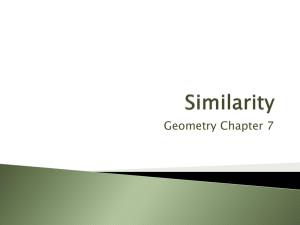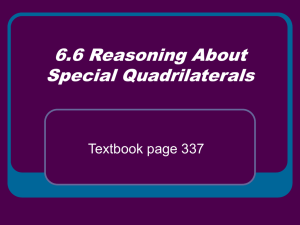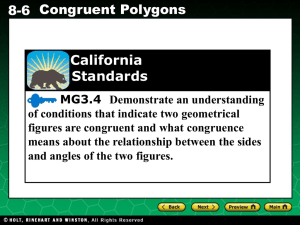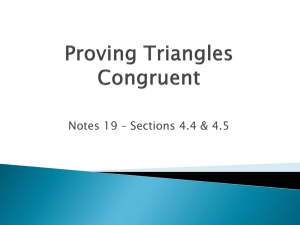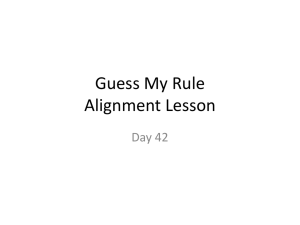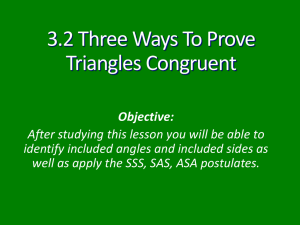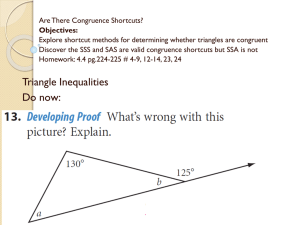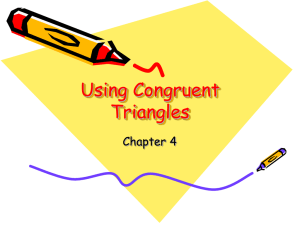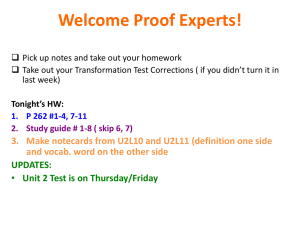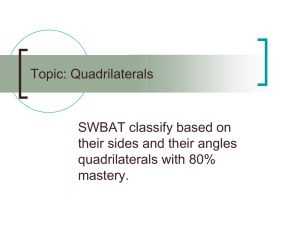Les. 2 - Mr. K`s Virtual World of Math
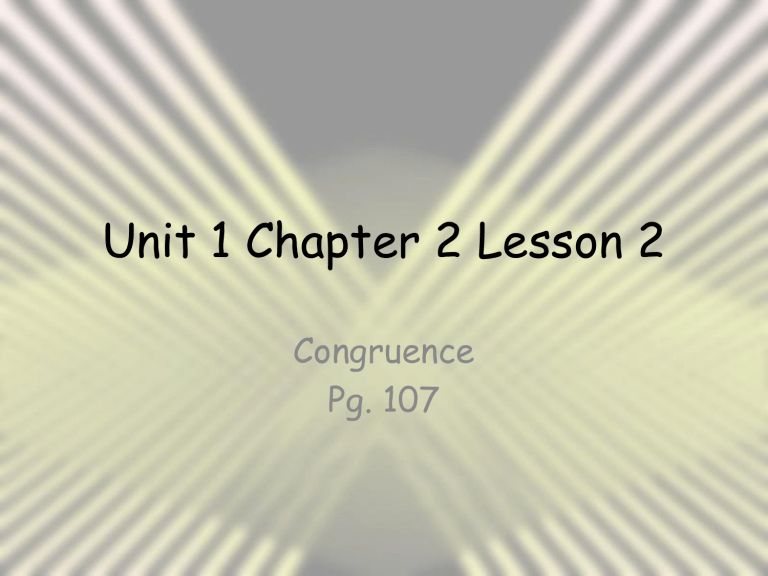
Unit 1 Chapter 2 Lesson 2
Congruence
Pg. 107
Learn
to use properties of congruent figures to solve problems.
Vocabulary
correspondence
A correspondence is a way of matching up two sets of objects.
If two polygons are congruent, all of their corresponding sides and angles are congruent.
Helpful Hint
Marks on the sides of a figure can be used
__ __
AB @ QR (1 mark)
BC @ PR (2 mark)
AC @ PQ (3 mark)
Writing Congruent Statements
Write a congruence statement for each pair of polygons.
The first triangle can be named triangle ABC . To complete the congruence statement, the vertices in the second triangle have to be written in order of the correspondence.
55
55
The congruence statement is triangle ABC @ triangle QRP.
Try this!
Write a congruence statement for each pair of polygons.
The first trapezoid can be named trapezoid ABCD . To complete the congruence statement, the vertices in the second trapezoid have to be written in order of the correspondence.
A
60°
120°
D
|
|||
120°
Q
|||
60°
B
C
120°
R
120°
T
60°
|
60°
S
The congruence statement is trapezoid ABCD @ trapezoid STQR.
Try this!
Write a congruence statement for each pair of polygons.
110°
The vertices in the first pentagon are written in order around the pentagon starting at any vertex.
F
A
110°
140°
B
140°
110°
E
110°
D
110° N
M
110°
140°
O
C
P
L
140°
110°
Q 110°
The congruence statement is hexagon ABCDEF @ hexagon MNOPQL .
Using Congruence Relationships to Find Unknown Values
In the figure, quadrilateral VWXY @ quadrilateral JKLM .
Find a .
a + 8 = 24 WX @ KL
–8 –8 Subtract 8 from both sides.
a = 16
Using Congruence Relationships to Find Unknown Values
In the figure, quadrilateral VWXY @ quadrilateral JKLM .
Find b .
6 b = 30
6 b = 30
6 6 b = 5
ML @ YX
Divide both sides by 6.
Using Congruence Relationships to Find Unknown Values
In the figure, quadrilateral VWXY @ quadrilateral JKLM .
Find c .
5 c = 85
5 c = 85
5 5 c = 17
J @ V
Divide both sides by 5.
Try This!
In the figure, quadrilateral JIHK @ quadrilateral QRST .
Find a .
K
H
4 b°
3 a
I
30°
J
R
6
S
120°
Q c + 10°
T
Try This!
In the figure, quadrilateral JIHK @ quadrilateral QRST .
Find b .
K
H
4 b°
3 a
I
30°
J
R
6
S
120°
Q c + 10°
T
Try This!
In the figure, quadrilateral JIHK @ quadrilateral QRST .
Find c .
K
H
4 b°
3 a
90°
I
R
90°
6
120°
S
30° J
Q c + 10°
T
Congruent Triangles
• We have learned about Congruent Polygons
– Congruency Statements lead to corresponding angles and sides
– Congruent simply means the same size and shape
• We will now expand this to study Congruent Triangles
• We will use four acronyms……….
NOT THE OTHER TWO….
Congruent Triangles
• If two figures are exactly the same size and shape, they are congruent.
• Two triangles are congruent if the following corresponding parts of two triangles are congruent.
– Three Sides ( SSS )
– Two angles and the included side ( ASA )
– Two sides and the included angle ( SAS )
– Two angles then a side ( AAS )
• Video below if to show why SSA and AAA do not work
• http://www.youtube.com/watch?v=DWWwo4l_s9g&feature=player_ embedded
Example
• Determine whether the triangles are congruent. If so, write a congruence statement and tell why
D
B
C
A
E
Determine whether the triangles are congruent. If so, write a congruence statement and tell why
P
S
J K
M L
R
Q
2 mm
U
T
Find the value of “x” in the following congruent triangle
60°
6 ft
(4x – 20)°
2 yds
Homework
• HC: pg.111-112 (1-5, 7-10)
• CC: pg. 111-112 (1-5, 7, 8, 10)
•
www.ixl.com
Q12
• Congruent Triangles Worksheet #1
